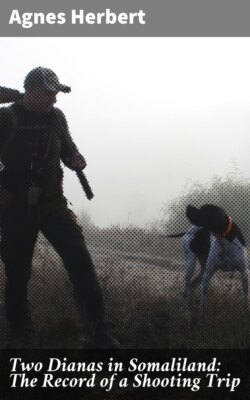Читать книгу Two Dianas in Somaliland: The Record of a Shooting Trip - Agnes Herbert - Страница 10
На сайте Литреса книга снята с продажи.
Оглавление
I was very much looking forward to the opportunity of bagging an oryx, I admire the horns of this antelope so greatly, though I suppose they are not really to be compared in the same breath with those of the koodoo. The oryx is very powerfully made, about the size of a pony, and the horns are long and tapering. They remind me of a vast pair of screws, the “thread” starting from the base and winding round to a few inches off the top when the horn is plain. They are the greatest fighters of all the genus buck, and the bulls are provided by nature, who orders all things well, with almost impenetrable protective horn-proof shields of immensely thick skin which covers the withers. These are much valued by the Somalis for many purposes, notably for the shields carried by them when in full dress. Set up as trophies they take a high polish and come up like tortoise-shell. One or two of mine I had mounted as trays, with protective glass, others as tables. All were exceedingly effective.
By this time we had got to and set out upon, not without some qualms, the waterless Haud, starting for the first march at cock-crow. In some parts it attains a width of over two hundred miles across. It all depends on where you strike it. We did the crossing in ten marches, taking five days over it. All that time we had to rely solely on the supply of water we carried with us, which was an anxious piece of work. I do not think we ever did so little washing in our lives before; water was too precious to juggle with then.
Haud is a Somali word signifying the kind of country so named, and may mean jungly ground or prairie-like plains. We crossed a part which reminded us both of the Canadian prairies, dried-up grass as far as the eye could reach. The waterless tract most crossed by travellers and trading caravans is arid and barren, and the paths are not discernible owing to the springy nature of the ground. Parts of the Haud are quite luxuriant, and provide grazing for countless thousands of camels, sheep, and goats. Our route lay over a flat, ugly, and uninteresting expanse. It was no use looking for signs of game. The new grass had not as yet appeared. Even the easily contented camels had to make believe a lot at meal-times.
We were marvellously lucky in our getting over this daunting place. At no time were we overwhelmed with the heat. A quite refreshing breeze blew over us most days, and at night we found it too cold to be pleasant. I called it luck, but Clarence attributed it to the will of Allah.
I got a fine bustard for the pot. A beautiful bird with a dark brown crest, and a coat, like Joseph’s, of many colours. I saved some of the feathers, they were so iridescent and beautiful. The bustard tribe in Somaliland appears to be a large one. I noticed three or four distinctly different species, with dissimilar markings. The Ogaden bustard had the prize, I think, in glory of plumage. Even his beak was painted green, his legs yellow, and all else of him shone resplendent. The cook made a bustard stew, and very good it tasted. We did not need to feel selfish, feasting so royally, for birds are not looked on with any favour by Somalis, though they do not refuse to eat them. I think it is because no bird, even an ostrich, can grow big enough to make the meal seem really worth while to a people who, though willing enough to go on short commons if occasion forces, enjoy nothing less than a leg of mutton per man.
Cecily, lucky person, shot a wart-hog, coming on him just as he was backing in to the little pied-à-terre they make for themselves. She did deserve her luck, for as I was out, and not able to help her, she had to dissect her prize alone. Pig is unclean to the Somali. Even the cook, who claimed to be “all same English,” was not English enough for this. We kept the tushes, and ate the rest. The meat was the most palatable of any we had tasted so far.
I bagged a wandering aoul, not at all a sporting shot. I got the buck in the near fore, and but for its terrible lameness I should never have come up with it at all. His wound, like Mercutio’s, sufficed. One might as well try to win the Derby on a cab-horse as come up with even a wounded buck on any of the steeds we possessed. I ambled along, and so slowly that the buck was outstripping the pony. I slipped off then, and running speedily, came within excellent range and put the poor thing out of his pain. His head was the finest of his kind we obtained.
The horns differ considerably, and I have in my collection backward and outward turning ones. Aoul is a very common gazelle in all parts of open country, barring South-East Somaliland, and travels about in vast herds. Its extraordinary inquisitiveness makes it fall a very easy victim.
Clarence went out with us in turn. His alternative was a fine upstanding fellow, but after three or four expeditions with him as guide I deposed him from the position of second hunter. He was slow, and lost his presence of mind on the smallest provocation, both of them fatal defects in a big game hunter, where quickness of brain and readiness of resource is a sine qua non.
